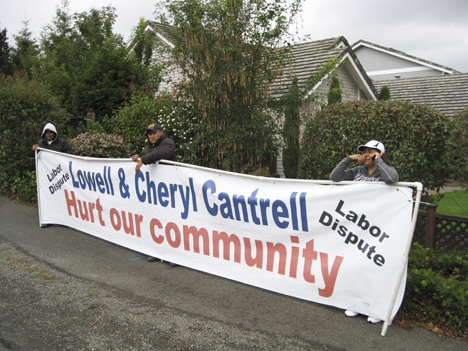The protest — civil, law-abiding and unambiguous — gathers momentum each morning to the cacophonous backdrop of horns, drums and whistles.
As the sun climbs, the ranks dwindle, so that by mid-morning only a few determined souls remain, holding a long “labor dispute” banner.
For those who care to look, the banner is an informational sign of the times. protesters unfurl it along a residential road connected to a private street that fronts the modest West Hill home of Tom Cantrell.
Some motorists honk as they pass the peaceful protest, staged along an interrupted sidewalk. protesters and drivers exchange a few waves.
From his home office, Cantrell shakes his head in frustration. He did not expect this and wishes it had never happened.
“They’re making general assumptions. I don’t think they’re telling the public what is truthful,” said Cantrell, owner and operator of Metier Construction Inc., an Auburn-based, private commercial contracting business. “I don’t know these people … but they come to attack my home. I am just shocked.
“This has been stressful for me and my family. … I have received death threats. I can’t affect free speech. I understand what they’re doing,” Cantrell said, yet he can’t understand why people identify him and his employees with rodents.
Cantrell and his workers have been described as “rats” in a leaflet circulated by members and families belonging to the Pacific Northwest Regional Council of Carpenters, a construction union with more than 23,000 members. The council claims the contractor doesn’t pay his employees area-standard wages, including health care and pension benefits.
Cantrell begs to differ. He insists he’s paying competitive, market-standard wages, including benefits, for a successful, non-union construction company that employs roughly 55.
“I don’t know how much more I can do for my employees,” Cantrell said. “My employees are happy.”
Cantrell helped build Metier from the ground up, but has done so on his own terms – without a union. He started the company about 15 years ago and has operated, he says, a fair and reputable firm.
But the competition isn’t happy with his way of doing business.
“It’s a question of area standards,” said Eric Franklin, communication director for the council. “By our own standards, carpenters should be making livable wages, having insurance for themselves and their families and putting something away.
“But (Cantrell) feels he pays what he can get away with, and he’s pretty happy with that.”
In a time of tough economic conditions, employee pay and benefits have come to the fore. Labor tensions have mounted. The competition has become extreme.
Not lost is the cost of doing business in the state, which has affected many companies, especially small firms.
And now a local labor dispute has led to the streets of a quiet neighborhood.
The council claims the dispute is not a union vs. non-union issue. The refusal or failure of a company to pay the area standards affects the entire construction industry and the community at large, the council said. It believes the community often ends up paying the health care tab for employees and their families, as well as paying for other social ills directly related to substandard wages.
But Cantrell says he’s playing fair, bidding fairly and considerately against union contractors. He says he has been open and communicative to his workers. He says he has the best interests of his employees at heart, even if they could be making higher wages elsewhere.
“Tom pays competitive wages and provides benefits. Anything a good employer should do,” said Judd Lees, Cantrell’s attorney.
“They clearly don’t want it portrayed as a union/non-union issue … that’s hard to get traction in these economic times,” Lees said.
Lees says Cantrell’s business is one of several the union-backed council is targeting.
While they might not like the way Cantrell conducts his business, the council feels obligated to maintain the demonstration — all for the welfare of the practicing carpenter.
“It’s informational, aimed at the public,” Franklin said of the demonstration.
The protest has continued for about a month. Cantrell isn’t optimistic that it will end anytime soon.
He stands firm.
“I can’t join the union,” he said. “It’s not something I’m going to do.
“I’m not obnoxious. I don’t cause trouble,” he added. “I’m a good citizen who supports my community.”


